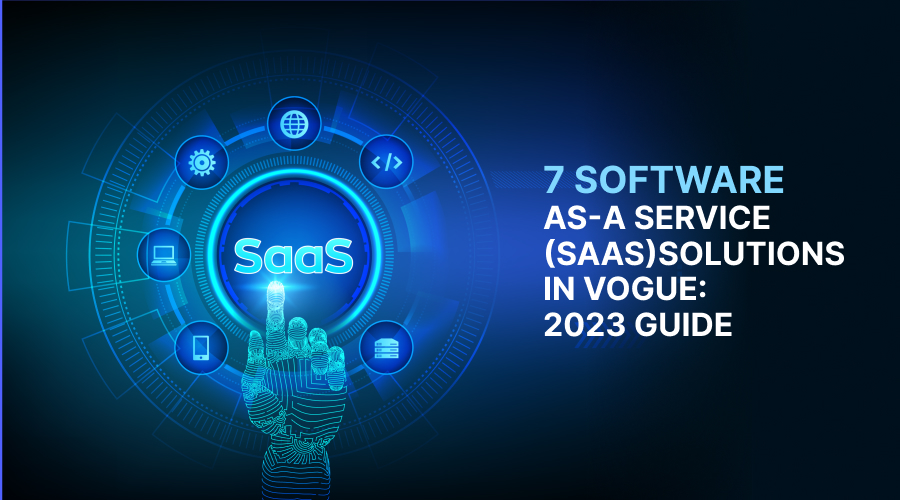Introduction
According to a survey by Gartner, SaaS solutions and investment in them are one of the top three Emerging Technology investments. Software-as-a-solution(SaaS) or cloud-based services are software delivery solutions that allow end users to access software via the Internet and are hosted on remote servers. These servers are maintained and updated by the company that provides these services to its users through web browsers, mobile apps, and APIs.
SaaS is a popular software delivery platform amongst businesses and service providers as it delivers a host of benefits over conventional software delivery models. These advantages include considerably reduced upfront costs, better scalability, flexibility, and accessibility. Since the software is available via the internet, businesses availing the software need not invest in expensive infrastructure to use the software. These businesses also need not purchase hefty software licenses but rather can avail it at a nominal subscription fee if and when required.
History of SaaS
When it comes to software delivery, the SaaS model is a young concept. Although its precursors date back to the 1960s era of computing, the modern-day SaaS delivery model did not emerge until the late 1990s and early 2000s. This was when the use of the internet saw a boom with the wide-scale adoption of online portals and websites. The computer terminals were also used to access a mainframe that hosted different applications. This marked the start of what we know today as modern-day SaaS solutions. The earliest SaaS application included Salesforce(1999) which offered web-based CRM solutions, and NetSuite which provided ERP software services hosted on the cloud, amongst others.
Top 7 Trends of the SaaS Industry in 2023
Artificial Intelligence
Autonomous, self-learning abilities of a computer, chatbot, or application are the ruling trend of 2023. Artificial Intelligence is reinventing our day-to-day functions with much ease while changing the way industries function. SaaS development equipped with Artificial development is slowly turning into a benchmark industry fixture for business. This is because Companies seem to realize the potential of AI in driving greater product, customer services, and content personalization while being technologically ahead in the digital markets. AI-infused SaaS technology products are also more efficient with better ROI and give more output for lesser inputs.
AI algorithms and smart neural networks can help businesses achieve faster anomaly detection, pattern recognition, and better response generation. It is all set to disrupt the SaaS development scenario with the following benefits:
Hyper-personalization
Technologies such as Natural Language Processing(NLP) personalized the user experience like never before. By mapping different human speech patterns, AI-generated chatbots, and customer service can be revolutionary and even better than human customer service at a fraction of the cost.
Speed
AI-led SaaS speeds up internal processes and operations which leads to better responsiveness, conflict resolution, and better forecasts.
Security
Since SaaS is delivered on the net, it is prone to many security breaches. However, AI can add an extra level of security when it comes to data and information security exchange over the cloud.
Data Intelligence
Modern SaaS-based AI platforms allow users to investigate new consumer intents, interests, and behaviors while collecting priceless data from numerous sources, cleaning it up, and segregating it to provide the most organizational value.
Other advantages include extracting autonomous insights that can be applied across several areas including designing the customer experience, better product development, making financial predictions, and much more. SaaS providers are using AI technologies to assist businesses in becoming smarter and more successful with fewer resources and money.
Machine Learning
Machine learning is an extended branch of Artificial Intelligence that focuses on the learning capabilities of a machine and processing data accordingly. Its ever-increasing implementation while building SaaS applications is a sign that it is going to be trending for a few years in the digital market.
Some of the important use cases of Machine learning in SaaS are (but are not limited to):
- E-commerce and services platform learning about customers’ preferences and habits, enabling businesses to craft their products catering accordingly;
- Processing large amounts of data and insights can help businesses optimize their services and target audience.
- Integrating ML algorithms in operational workflows amounts to better internal collaboration and operations.
- Increasing customer interactions and quality of service.
- Ensuring superior data security.
Micro SaaS
With the advent of no-code platforms online, SaaS development is no longer a big project requiring a huge number of developers and resources. Rather small SaaS products can now be seen in mainstream IT markets. These Micros SaaS entities are often managed by a very small team of individuals or an individual, thanks to these no-code platforms. Technical knowledge and coding are no longer a requisite for entities, small and medium enterprises looking to develop their SaaS products aka Micro SaaS products. Examples of No code platforms include:
- Airtable
- Glide
- Appy Pie
- Quickbase
- Microsoft Power Apps
- Softer
- ServiceNow App Engine
- Salesforce Platform
Low-code applications for building SaaS products
Low-code SaaS development platforms are the new trend hitting the markets. Such platforms are an efficient option for reducing the development time of SaaS products. Compared to conventional models of development for SaaS products, Low code platforms help build similar products in a fraction of the time, debug faster, and launch products sooner to the masses. It’s even easier to add new features via these low-code platforms. Another great attribute of a low-code platform is that more and more stakeholders can participate in the development of the product. This leads to better alignment of the product with user needs.
Many low-code platforms are trending these days when it comes to building a SaaS product while complying with all laws and regulations. Webflow, Carrd, Bubble Zoho Creator, and Thunkable are some of the few such low-code platforms that can help build a creative SaaS product at fraction of cost and money.
Vertical SaaS
Vertical SaaS is another niche SaaS development technique that is cropping across multiple IT industries such as retail, insurance, or auto manufacturing. Vertical SaaS refers to cloud computing solutions designed specifically for an industry. Many SaaS startups are focused solely on one industry vertical and offer services just relevant to that industry. One fine example of a vertical SaaS product is IBM’s Genelco which is a software designed to handle life and health policy processing along with processing annuity portfolios. Many other vertical SaaS products designed have made it to the market. Given below are popular examples of vertical SaaS present in the market.
- Riskalyze (analyzing investment risks)
- Clear Care (CRM software)
- Guidewire (Insurance)
SEO for SaaS
Search-Engine Optimisation for SaaS products is another trend all set to make waves in 2023. This is because cloud-based software operates via the internet and therefore has to cater majorly to a digital audience. Search engine optimization techniques ensure that the product reaches the maximum target audience well before the product’s competitors. It enhances the visibility of the product on the search engines and a high ranking on search results adds to the credibility of the SaaS product. In 2023, businesses are all set to invest in search engine optimization and recruit talented SEO specialists for the same. One can expect the demand for SEO skill set to rise in the coming years.
White label SaaS
A white-label SaaS product refers to an unbranded SaaS product that is created by a software development company and rebranded by the company that buys it from the creator. Though a relatively new concept, white-labeled SaaS is finding its popularity amongst resellers and software companies. This not only saves time, money, and resources but also scalability and flexibility to businesses looking not to invest in SaaS development projects.
Some examples of White Label SaaS businesses include:
- Mautic
- Inbox Army
- SendinBlue
- Moosend etc
Conclusion
Starting as ‘the time sharing system’, SaaS has come a long way. Its variety of benefits over traditional software models has turned it into a success. Businesses are realizing the potential of investing in SaaS products and the demand for SaaS developers has increased exponentially. OpenXcell is one such enterprise software development company that has a rich portfolio of developing exceptional software products. The company is a go-to option for businesses looking to develop their own SaaS product or hiring developers for the same.









